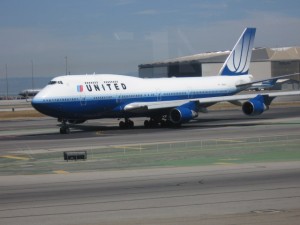By Nicholas Kralev
The Washington Times
February 15, 2010
Is there an inherent conflict between the desires of loyal customers and a travel company’s interests? For years, executives have been acting as if there is, despite of what they might say in public. One of them, however, has actually shown that what’s good for travelers doesn’t have to be bad for business.
Graham Atkinson has been president of United Airlines’ frequent-flier program, Mileage Plus, for only 16 months, but while some questionable policies remain in place, he has made a big difference for the better. His approach is not simply to please the carrier’s best customers — it’s to listen to them carefully and find ways to benefit the company at the same time.
Mr. Atkinson, who is also United’s executive vice president and was previously chief customer officer, hasn’t sought much credit for his achievements. In fact, recent Mileage Plus announcements and letters to members have been issued in the name of his deputy, Robert Sahadevan. “I wanted to give Robert a bit of the limelight,” Mr. Atkinson said on Friday.
Although he hasn’t spoken much about his work publicly since his appointment in October 2008, Mr. Atkinson’s actions have said quite a lot. It’s clear he understood from the very beginning that making it easier for customers to use their frequent-flier miles is a good long-term policy — it creates a huge amount of good will and decreases the company’s liability.
So last year, he began knocking down artificial barriers to redeeming miles that airlines had erected in the past decade. As I reported in August, while the industry was busy slapping all sorts of new fees on passengers, United became the first U.S. carrier to eliminate “close-in” fees of up to $100 for booking “award” tickets less than 21 days before travel. No other airline has followed suit.
In October, Mileage Plus announced that it would no longer issue so-called confirmed regional upgrade certificates — a rare benefit in the industry that allows top elite members to secure a seat in a higher class of service on flights in North and Central America months in advance, if available, without spending miles. The reason cited for the change was a new system, to be introduced in the spring, under which all elite members would be eligible for free upgrades without having to use certificates, but only a couple of days before travel.
The decision to take away the confirmed certificates caused an uproar among top fliers, who let United know how they felt. Mr. Atkinson and his team listened, and a month later, they agreed to keep those upgrades in place. It didn’t hurt that American Airlines, which United considers its main competitor, continues to offer such certificates, though most U.S. carriers don’t.
Another United move that was influenced by American was the introduction of one-way “awards” earlier this month — again, United watched the competition but also listened to customers, who have wanted that benefit for years. While one-way “awards” have been offered by foreign carriers, such as Air Canada and British Airways, for years, U.S. airlines have been surprisingly stubborn and short-sighted — for no good reason.
This is one of those policies dating back to the beginning of frequent-flier programs, when round-trip travel was the norm, and neither the industry nor passengers cared much for one-way tickets. But travel patterns have changed as travelers have become more sophisticated. Unfortunately, most airlines still fail to understand that allowing one-way “awards” for half the mileage needed for a round trip is actually good for them. They are much more likely to unload miles off their books this way, rather than by charging round-trip mileage for one-way tickets, which very few customers are willing to accept.
Investing in new software to enable one-way bookings is apparently the deal-breaker for most carriers, and American, United and Alaska Airlines have set a good example. For the time being, United’s one-way “awards,” as well as its new “miles and money awards,” are limited to its own flights for technical reasons — those tickets can only be booked on its Web site, which doesn’t offer access to partner “awards,” Mr. Atkinson said. When phone agents are able to book them — sometime in the summer — partner-carriers will be included, he said.
The only downside to American’s new policy, which was introduced in May, was the elimination of stopovers on round-trip “awards” — if you want to visit two cities, you need to book three one-way segments, and that will cost you more miles. Naturally, United customers are wondering what they should expect, but Mileage Plus hasn’t “made a call yet,” Mr. Atkinson said. Currently, phone agents can book stopovers on round trips.
As regular readers of this column know well, there is one policy that keeps Mileage Plus from being the best program in the U.S. industry — its massive blocking of “award” seats otherwise made available for mileage redemption by its partners in the global Star Alliance, such as Lufthansa, Thai Airways and Singapore Airlines.
That practice was put in place long before Mr. Atkinson took over, and ending it won’t be easy. If it opened up all blocked seats, the carrier would have to compensate its partners for any bookings, and its current budget structure apparently doesn’t allow that.
As long as the practice continues, however, many customers will deem their United miles less valuable than those in other programs. Not that Mr. Atkinson needs any more reminding of that.
This column was first published by The Washington Times

